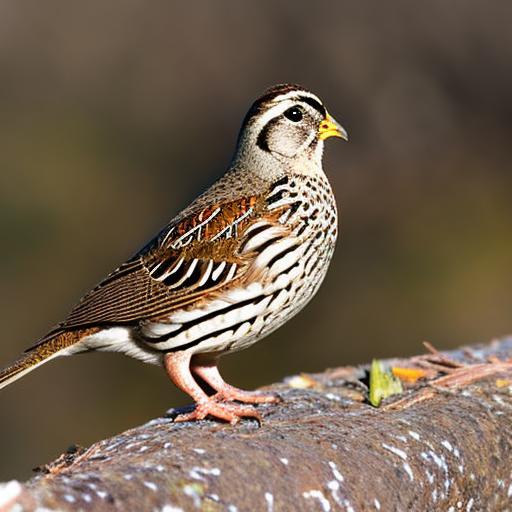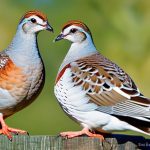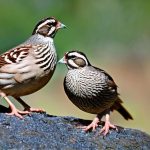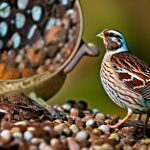Quails are small, ground-dwelling birds that have become increasingly popular as pets in recent years. They are known for their gentle nature, low maintenance requirements, and the delightful sound of their calls. Keeping quail as pets can be a rewarding experience for bird enthusiasts and those looking for a unique addition to their backyard or indoor aviary. Quails come in a variety of species, each with its own distinct characteristics and care requirements. Whether you are a beginner or an experienced bird keeper, quails can make a wonderful addition to your home.
Quails are known for their small size, making them suitable for homes with limited space. They are also relatively quiet compared to other birds, making them ideal for urban or suburban environments where noise can be a concern. Additionally, quails are known for their gentle and social nature, making them enjoyable pets for both adults and children. With the right care and attention, quails can live for several years, providing companionship and entertainment for their owners. In this article, we will explore the various aspects of keeping quail as pets, including choosing the right species, housing and enclosure requirements, feeding and nutrition, health and veterinary care, behavior and socialization, and tips for enriching your quail’s environment.
Key Takeaways
- Quail make great pets for those with limited space and a desire for low-maintenance animals.
- When choosing a quail species, consider factors such as size, egg production, and temperament.
- Quail require a secure enclosure with proper ventilation, protection from predators, and space for foraging.
- A balanced diet for quail includes commercial feed, fresh greens, and access to grit and calcium supplements.
- Regular health check-ups, proper hygiene, and prompt treatment of any illnesses are essential for maintaining quail health.
Choosing the Right Quail Species for Your Home
When it comes to keeping quail as pets, there are several species to choose from, each with its own unique characteristics and care requirements. Some of the most popular quail species kept as pets include the Coturnix quail, Bobwhite quail, California quail, and Gambel’s quail. The Coturnix quail, also known as the Japanese quail, is one of the most commonly kept species due to its small size, gentle nature, and prolific egg-laying capabilities. Bobwhite quails are known for their distinctive call and are often kept for their charming personalities. California quails are native to the western United States and are known for their striking appearance and sociable behavior. Gambel’s quails are also native to the southwestern United States and are prized for their beautiful plumage and melodious calls.
When choosing a quail species for your home, it is important to consider factors such as space requirements, noise levels, and egg-laying capabilities. Coturnix quails are popular for their small size and prolific egg-laying abilities, making them a great choice for those interested in raising quails for eggs. Bobwhite quails are known for their charming personalities and distinctive calls, making them a popular choice for those looking for a more interactive pet. California and Gambel’s quails are prized for their striking appearance and sociable behavior, making them ideal for those looking for a visually appealing and social pet. Ultimately, the right quail species for your home will depend on your individual preferences and the specific care requirements of each species.
Housing and Enclosure Requirements for Quail
When it comes to housing and enclosure requirements for quails, it is important to provide a safe and comfortable environment that meets their specific needs. Quails are ground-dwelling birds that require ample space to move around and exhibit natural behaviors such as dust bathing and foraging. For indoor enclosures, a large wire cage with a solid bottom is recommended to provide adequate space for movement and prevent injury to the birds’ feet. Outdoor enclosures should be spacious and secure, with a solid floor to protect the birds from predators and provide a suitable substrate for dust bathing.
In addition to space requirements, quails also require access to fresh air, natural light, and protection from extreme temperatures. Indoor enclosures should be placed in a well-ventilated area with access to natural light or supplemented with full-spectrum lighting to mimic natural daylight. Outdoor enclosures should be located in a sheltered area with access to shade and protection from harsh weather conditions. It is also important to provide suitable nesting boxes or shelters for quails to lay eggs and seek refuge when needed. Overall, providing a safe and comfortable housing environment is essential for the health and well-being of pet quails.
Feeding and Nutrition for Quail
Feeding and nutrition are crucial aspects of caring for pet quails to ensure their health and well-being. Quails are omnivorous birds that require a balanced diet consisting of high-quality commercial feed, fresh fruits and vegetables, and access to grit and calcium supplements. A commercial game bird feed with at least 20% protein is recommended as the primary source of nutrition for quails. This feed should be supplemented with fresh fruits and vegetables such as leafy greens, carrots, and berries to provide essential vitamins and minerals.
In addition to commercial feed and fresh produce, quails also require access to grit and calcium supplements to support their digestive health and egg production. Grit helps quails grind their food in their gizzards, while calcium supplements are essential for laying hens to maintain strong eggshells. It is important to provide access to clean water at all times to prevent dehydration and support overall health. Additionally, offering occasional treats such as mealworms or scrambled eggs can provide enrichment and variety in the quails’ diet. Overall, providing a balanced and nutritious diet is essential for the health and longevity of pet quails.
Quail Health and Veterinary Care
Maintaining the health of pet quails is essential for their well-being and longevity. Regular health checks and veterinary care can help prevent and address potential health issues that may arise. It is important to observe your quails daily for any signs of illness or injury, such as changes in behavior, decreased appetite, or abnormal droppings. Any concerns should be promptly addressed by a qualified avian veterinarian to ensure proper diagnosis and treatment.
In addition to regular health checks, it is important to provide a clean living environment, proper nutrition, and access to fresh water to support the overall health of pet quails. Regular cleaning of the enclosure, providing a balanced diet, and ensuring access to clean water can help prevent common health issues such as respiratory infections, parasites, or nutritional deficiencies. It is also important to provide appropriate preventive care such as vaccinations or parasite control as recommended by a veterinarian. By prioritizing the health and well-being of pet quails through proper care and veterinary attention when needed, owners can ensure that their feathered friends live happy and healthy lives.
Quail Behavior and Socialization
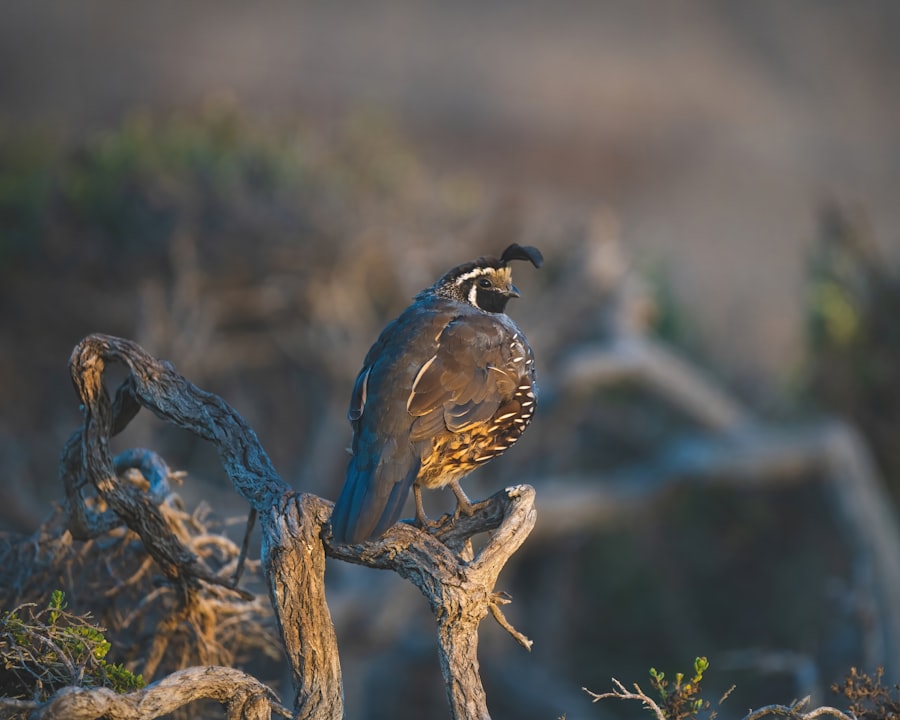
Quails are social birds that thrive in the company of their own kind. They are known for their gentle nature and sociable behavior, making them enjoyable pets for both adults and children. Quails are also known for their vocalizations, which can range from soft chirps to melodious calls depending on the species. Providing suitable socialization opportunities is essential for the well-being of pet quails.
When keeping multiple quails together, it is important to provide adequate space to prevent overcrowding and potential aggression among the birds. Providing suitable hiding spots or shelters can also help reduce stress and promote natural behaviors such as nesting or dust bathing. Additionally, providing enrichment such as perches or toys can help keep quails mentally stimulated and prevent boredom.
Quails can also be kept alongside other bird species such as chickens or doves if introduced properly and provided with adequate space and resources. However, it is important to monitor interactions between different bird species to ensure compatibility and prevent potential conflicts.
Tips for Enriching Your Quail’s Environment
Enriching your quail’s environment is essential for promoting natural behaviors, mental stimulation, and overall well-being. Providing suitable enrichment can help prevent boredom, reduce stress, and promote physical activity among pet quails. Some tips for enriching your quail’s environment include providing perches or platforms for roosting, offering hiding spots or shelters for nesting or resting, providing access to dust baths or sand baths for grooming, offering toys or objects for pecking or exploration, providing access to fresh vegetation or insect treats for foraging opportunities.
Additionally, providing opportunities for socialization with other quails or compatible bird species can help promote natural behaviors such as vocalizations or flock dynamics. It is important to regularly assess your quail’s environment and provide new enrichment opportunities to prevent habituation or boredom. By prioritizing enrichment in your quail’s environment, you can help ensure that they lead happy, healthy lives in captivity.
In conclusion, keeping quail as pets can be a rewarding experience for bird enthusiasts looking for a unique addition to their home or backyard aviary. By choosing the right species, providing suitable housing and enclosure requirements, offering a balanced diet with proper nutrition, prioritizing health care through regular veterinary checks, promoting socialization opportunities, and enriching their environment with suitable enrichment opportunities, owners can ensure that their pet quails lead happy and healthy lives in captivity. With the right care and attention, pet quails can provide companionship, entertainment, and joy for their owners for many years to come.
If you’re considering keeping quail as pets, you may also be interested in learning about the egg-laying habits of geese. Understanding how many eggs geese lay can provide valuable insights into their breeding and care. Check out this informative article on PoultryWizard to expand your knowledge of poultry and avian husbandry.
FAQs
What are some basic facts about keeping quail as a pet?
Quail are small ground-dwelling birds that are relatively easy to care for and can be kept as pets. They are social animals and enjoy the company of other quail.
What kind of housing do quail need as pets?
Quail need a secure and spacious enclosure that provides protection from predators and the elements. A coop or aviary with a solid floor and a covered outdoor area is ideal.
What do quail eat as pets?
Quail should be fed a diet of commercial game bird feed, supplemented with fresh fruits and vegetables. They also enjoy foraging for insects and seeds.
What kind of care do quail require as pets?
Quail need regular access to clean water, a clean living environment, and regular health checks. They also need space to dust bathe and exercise.
Can quail be kept indoors as pets?
Quail can be kept indoors, but they require a well-ventilated and spacious enclosure. It’s important to provide them with a natural day-night cycle and access to sunlight or a full-spectrum light.
Are quail good pets for children?
Quail can make good pets for children with proper supervision and guidance. They are generally docile and can be enjoyable to watch, but they do require responsible care and handling.
Meet Walter, the feathered-friend fanatic of Florida! Nestled in the sunshine state, Walter struts through life with his feathered companions, clucking his way to happiness. With a coop that’s fancier than a five-star hotel, he’s the Don Juan of the chicken world. When he’s not teaching his hens to do the cha-cha, you’ll find him in a heated debate with his prized rooster, Sir Clucks-a-Lot. Walter’s poultry passion is no yolk; he’s the sunny-side-up guy you never knew you needed in your flock of friends!

